1061 scholarly books by Catholic University of America Press and 46
have author last names that start with T
1061 scholarly books by Catholic University of America Press and 46
1061 scholarly books by Catholic University of America Press
46 have author last names that start with T have author last names that start with T
46 have author last names that start with T have author last names that start with T
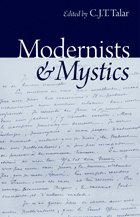
Modernists and Mystics
C. J. T Talar
Catholic University of America Press, 2009
In the six original essays included in this volume, the authors discuss how von Hügel, Blondel, Bremond, and Loisy all found inspiration in the great mystics of the past.
[more]
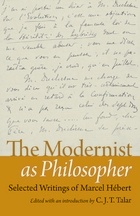
The Modernist as Philosopher
Selected Writings of Marcel Hebert
C. J. T. Talar
Catholic University of America Press, 2011
This volume, the first to be published in English about Hébert, is essential for a full understanding of Catholic Modernism.
[more]

Constancy and the Ethics of Jane Austen's 'Mansfield Park'
Joyce Kerr Tarpley
Catholic University of America Press, 2010
Constancy and the Ethics of Jane Austen's Mansfield Park offers a rigorous philosophical examination of the novel, the first book-length, close reading to do so.
[more]
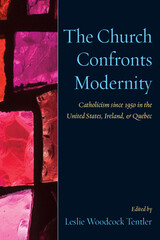
The Church Confronts Modernity
Leslie Woodcock Tentler
Catholic University of America Press, 2007
The Church Confronts Modernity assesses the history of Roman Catholicism since 1950 in the United States, the Republic of Ireland, and the Canadian province of Quebec
[more]
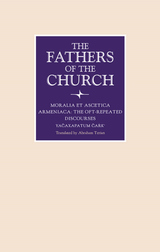
Moralia et Ascetica Armeniaca
The Oft-Repeated Discourses
Abraham Terian
Catholic University of America Press, 2022
The twenty-three discourses presented in this volume have a long textual history that ascribes them to St. Gregory the Illuminator of Armenia (d. 328), a prevalent view that lasted through the nineteenth century. Armenian scholarship through the last century has tended to ascribe them to St. Mashtots‘, the inventor of the Armenian alphabet (d. 440). In his critical introduction to this first-ever English translation of the discourses, Terian presents them as an ascetic text by an anonymous abbot writing near the end of the sixth century. The very title in Armenian, Yačaxapatum Čaŕk‘, literally, “Oft-Repeated Discourses,” further validates their ascetic environment, where they were repeatedly related to novices. For want of answers to introductory questions regarding authorship and date, and because of the pervasive grammatical difficulties of the text, the document has remained largely unknown in scholarship.
The discourses include many of the Eastern Fathers’ favorite theological themes. They are heavily punctuated with biblical quotations and laced with recurring biblical images and phraseology; the doctrinal and functional centrality of the Scriptures is emphasized throughout. They are replete with traditional Christian moral teachings that have acquired elements of moral philosophy transmitted through Late Antiquity. Echoes of St. Basil’s thought are heard in several of them, and some evidence of the author’s dependence on the Armenian version of the saint’s Rules, translated around the turn of the sixth century, is apparent. On the whole they show how Christians were driven by the Johannine love-command and the Pauline Spirit-guided practice of virtuous living, ever maturing in the ethos of an in-group solidarity culminating in monasticism.
[more]
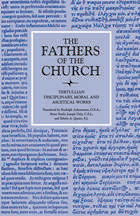
Disciplinary, Moral, and Ascetical Works
Tertullian
Catholic University of America Press, 1959
No description available
[more]
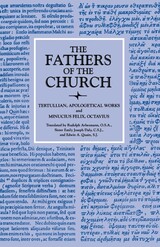
Apologetical Works; Octavius
Minucius Tertullian
Catholic University of America Press, 2008
No description available
[more]
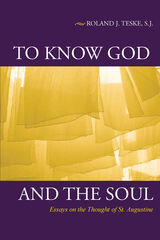
To Know God and the Soul
Essays on the Thought of Saint Augustine
Roland J. Teske
Catholic University of America Press, 2008
To Know God and the Soul presents a collection of essays on Augustine of Hippo written over the past twenty-five years by renowned philosopher Roland Teske.
[more]
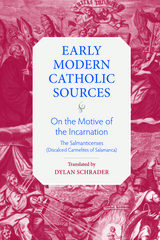
On the Motive of the Incarnation
Dylan The Salmanticenses
Catholic University of America Press, 2019
The Catholic University of America Press is pleased to announce a new series, Early Modern Catholic Sources, edited by Ulrich L. Lehner and Trent Pomplun. This series – the only one of its kind – will provide translations of early modern Catholic texts of theological interest written between 1450 and 1800.
The first volume in this series is On the Motive of the Incarnation, the first English translation of the seventeenth-century Discalced Carmelites at the University of Salmanca treatise on the motive of the Incarnation. Originally intended for students of their order, it became a major contribution to broader theological discourse. In this treatise, they defend the assertion that God intended Christ’s Incarnation essentially as a remedy for sin, such that if Adam had not sinned Christ would not have become incarnate, and that, at the same time, God intended all other works of nature and grace for the sake of Christ at their end. The Salmanticenses’ position thus combines elements of the Franciscan and Dominican traditions, stemming from the thought of Blessed John Duns Scotus and Saint Thomas Aquinas. This treatise is an exhaustive effort to show how the Scotistic emphasis on the primacy of Christ as the first willed and intended by God can be articulated within a Thomistic framework that acknowledges the contingency of the Incarnation on the need for redemption. In addition to the translation, the volume will include a brief introduction and extensive notes for theologians, historians, and students.
[more]
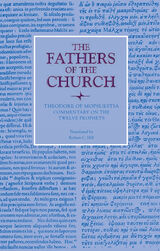
Commentary on the Twelve Prophets
Robert C. Theodore of Mopsuestia
Catholic University of America Press, 2004
No description available
[more]
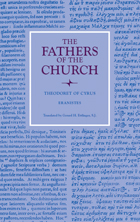
Eranistes
Gerard H. Theodoret of Cyrus
Catholic University of America Press, 2003
No description available
[more]
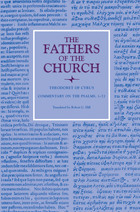
Commentary on the Psalms, Psalms 1-72
Robert C. Theodoret of Cyrus
Catholic University of America Press, 2000
No description available
[more]
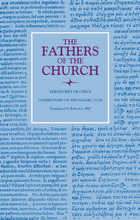
Theodoret of Cyrus
commentary on the Psalms, 73-150
Robert C. Theodoret of Cyrus
Catholic University of America Press, 2000
No description available
[more]
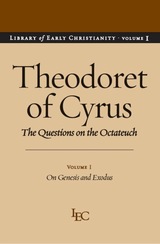
The Questions on the Octateuch, Volume 1
John F. Theodoret of Cyrus
Catholic University of America Press, 2007
No description available
[more]
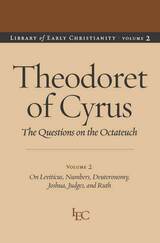
The Questions on the Octateuch, Volume 2
John F. Theodoret of Cyrus
Catholic University of America Press, 2007
No description available
[more]
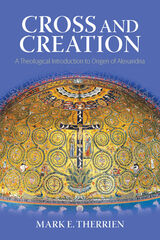
Cross and Creation
A Theological Introduction to Origen of Alexandria
Mark E. Therrien
Catholic University of America Press, 2022
Even though the theology of Origen of Alexandria has shaped the Christian Tradition in almost every way, the controversies over his legacy have been seemingly endless. One major interpretative trend, for example, has suggested Origen’s theology is really akin to the heterodox Gnostics against whom he wrote than the actual teaching of the Gospel, since he (supposedly) had a disdainful attitude towards Creation and ultimately saw little redemptive meaning in the Passion.
In Cross and Creation: A Theological Introduction to Origen of Alexandria, Mark Therrien offers an original interpretation of Origen’s theology. Focusing on some of Origen’s most important works (especially On First Principles and the Commentary on John, but ultimately making reference to his writings more broadly), this book retrieves and examines some of the foundational pillars of Origen’s theology through close readings and re-examinations of those texts. It examines eight of these theological foundations: God, Christ, the Holy Spirit, the end, the soul, the world, the cross, and deification. Moreover, by showing the connections between Origen’s understanding of these foundational pillars, it also shows the coherence of his theology as a whole. Taken collectively, what emerges from these eight chapters is that two doctrines specially shape Origen’s theology: Cross and Creation. As Therrien shows, Origen did not hold contempt for Creation. Rather, Origen thinks that Creation emerges from the very life of God as eternally foreknown and provided for in the person of Christ, the Wisdom of God the Father. Moreover, he also holds that, though fallen, Creation will be restored according to its original, eternal intention in God precisely through the Passion of Jesus Christ on the Cross. The Cross is thus not minimalized in Origen’s theology; it is rather its very center.
[more]
![front cover of On Creation [Quaestiones Disputatae de Potentia Dei, Q. 3]](https://www.bibliovault.org/thumbs/978-0-8132-1798-7-thumb.jpg)
On Creation [Quaestiones Disputatae de Potentia Dei, Q. 3]
Thomas Aquinas
Catholic University of America Press, 2011
No description available
[more]
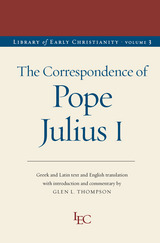
The Correspondence of Pope Julius I
Glen Thompson
Catholic University of America Press, 2015
Please fill in marketing copy
[more]
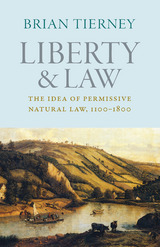
Liberty and Law
Brian Tierney
Catholic University of America Press, 2014
Liberty and Law examines a previously underappreciated theme in legal history - the idea of permissive natural law. The idea is mentioned only peripherally, if at all, in modern histories of natural law. Yet it engaged the attention of jurists, philosophers, and theologians over a long period and formed an integral part of their teachings. This ensured that natural law was not conceived of as merely a set of commands and prohibitions that restricted human conduct, but also as affirming a realm of human freedom, understood as both freedom from subjection and freedom of choice. Freedom can be used in many ways, and throughout the whole period from 1100 to 1800 the idea of permissive natural law was deployed for various purposes in response to different problems that arose. It was frequently invoked to explain the origin of private property and the beginnings of civil government.
[more]
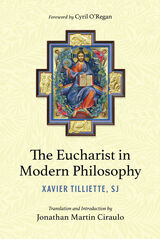
The Eucharist in Modern Philosophy
Xavier Tilliette
Catholic University of America Press, 2022
The Eucharist in Modern Philosophy is one of the last books written by the renowned Jesuit philosopher Xavier Tilliette (1921-2018), and the first to be translated into English. Jonathan Martin Ciraulo, the translator, also provides an introduction to the thought of Tilliette and the content of this book, while Cyril O’Regan provides the foreword, noting the particular intellectual characteristics of Tilliette and his analysis of eucharistic philosophies.
In addition to being known as one of the foremost experts on the German Idealist Friedrich Schelling, Tilliette wrote voluminously on the relationship between modern philosophy and theology, particularly concerning the way in which Christology is central to the development of modern philosophy. In this volume, he extends that project to look at how various philosophers, such as Descartes, Leibniz, Hegel, Blondel, and Marion, as well as poets and mystics, such as de Chardin, Simone Weil, and Paul Claudel, thought extensively about the question of the Eucharist. The result is an enormous diversity of Eucharistic thought, from Descartes’ attempt to justify transubstantiation in light of his philosophical revolution, to Feuerbach’s supposed exposure of the contradiction inherent to sacramentality, to Antonio Rosmini’s eucharistic piety and speculation, to Maurice Blondel’s recovery and expansion of Leibniz’s notion of the substantial bond. Tilliette shows that this philosophical conversation about the Eucharist is a living tradition, as the aporias and failures of one generation provide stimulus for all that follows. Much of the work is largely historical, showing in great detail the context of each particular eucharistic philosophy, but Tilliette also evaluates the relative fruitfulness of the various eucharistic theories for philosophy, theology, and the life of the Church. This book demonstrates that the Eucharist has been, and will likely continue to be, a major impetus for philosophical reflection.
[more]
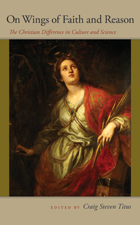
On Wings of Faith and Reason
The Christian Difference in Culture and Science (John Henry Cardinal Newman Lecture)
Craig Steven Titus
Catholic University of America Press, 2008
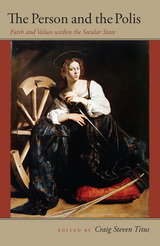
The person and the polis
faith and values within the secular state
Craig Steven Titus
Catholic University of America Press, 2006
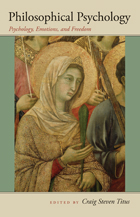
Philosophical psychology
psychology, emotions, and freedom
Craig Steven Titus
Catholic University of America Press, 2009
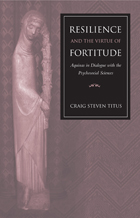
Resilience and the virtue of fortitude
Aquinas in Dialogue with the Psychosocial Sciences
Craig Steven Titus
Catholic University of America Press, 2006
The book offers a renewed, classic vision of the human person and the ordering of the sciences as read through the complementary and, at one level, corrective insights of empirical psychosocial studies on resilience.
[more]
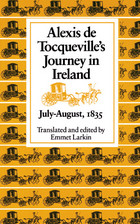
Alexis de Tocqueville's journey in Ireland, July-August, 1835
Alexis de Tocqueville
Catholic University of America Press, 1990
This edition of his journal is perhaps the first serious scholarly effort to place Tocqueville's journey to Ireland in its proper intellectual, geographical, and historical context.
[more]
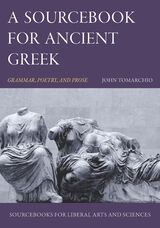
A Sourcebook for Ancient Greek
Grammar, Poetry, and Prose
John Tomarchio
Catholic University of America Press, 2022
This book was designed for students transitioning from the study of Greek grammar to translation of texts. It was developed in classroom use for classroom use, in the context of an integrated Great Books program in liberal arts and sciences. It is meant for students not only of Classics, but more, for students of Humanities interested in direct engagement of primary sources. Each Greek text offered for translation was chosen for its theoretical interest as well as the interest of its Greek.
The selections of Greek literature offered in this Sourcebook are wide-ranging. The indisputable standard of excellence for classicists is of course the Attic dialect of Athens in its glory. However, this Sourcebook is meant for students of liberal arts and sciences whose interests range far more widely. Thus, it does not hesitate to extend not only backward to the archaic Greek of Homer, but also forward to the koine Greek of the Alexandrian and Roman empires. Greek works were chosen for being seminal to Western thinking today, chosen to give students of Western arts and sciences introductions to its Greek sources
Naturally, Greek grammar is taught to the newcomer analytically and sequentially, but the continuing student needs to synthesize these distended enumerations of elements and principles. Accordingly, grammatical synopses are not appended as reference tables but placed front and center as objects of study. The grammar tables offer synoptic views of integral parts of Greek grammar to show the form and logic of the whole part of speech or part of a sentence. On the basis of these tables, detailed grammatical notes and commentary appended to Greek selections that follow are tailored for continuing students.
[more]
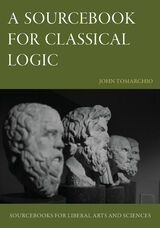
A Sourcebook for Classical Logic
John Tomarchio
Catholic University of America Press, 2023
This Sourcebook offers a brief sequence in classical Logic befitting an unspecialized study for students of liberal arts and sciences. The sequence is made up of select texts of the Aristotelian Organon, mostly the opening chapters of each treatise, in the traditional order, where Aristotle lays out the primary elements of reasoning. Study aids accompany these primary texts, providing students with mnemonics and diagrams developed for classroom use in the great books programs St. John’s College. The culmination of this Aristotelian Logic sequence is selections from the Posterior Analytics where Aristotle offers an account of the demonstrative reasoning of theoretical sciences. The interest of this Sourcebook, as of Aristotelian Logic, is search for such knowledge.
This Aristotelian sequence is preceded by a sequence of readings in Medieval grammatica speculativa, or philosophy of language. This propaedeutic sequence begins with an ancient source to which that metaphysically minded ‘grammar’ recurred, namely Augustine’s De magistro, or On the Teacher. It is a dialogue between Augustine and his son about the triadic relation of the spoken word to the word thought and the thing thought about. This aporetic dialectic between Augustine and his son proves effective in awakening students to the theoretical stakes of Logic. Similarly, from later theological inquiries into language for purposes of scriptural interpretation more general theories of language emerged. The theoretical uses thus made of Aristotelian Logic by the Jewish theologian Maimonides and the Catholic Thomas Aquinas whet student appetite for the technical matter of the Organon sequence to follow.
[more]
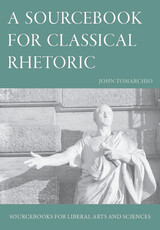
A Sourcebook for Classical Rhetoric
John Tomarchio
Catholic University of America Press, 2023
This Sourcebook is intended for students of liberal arts and great books. It treats such books as primary sources for inquiring into the nature of human speech because they clarify the terms and stakes of perennial questions thinking human beings ask themselves about persuasive speaking. By crystallizing viable claims about the nature of what we confront in politics and society—live claims for us to confront in our own, with the stakes of that confrontation being live as well—they originate a dialectic with one another and with us their readers.
Cicero called rhetoric a liberal art necessary for every citizen of a free republic. In the polities of ancient Greece and Rome, rhetoric was politically potent because oratory was the regular means of political decision. Words were decisive, often a matter of life and death, not merely for individuals but for peoples. In human milieux where human speech is so politically decisive, reflection upon its nature became keen.
The selections of this sourcebook have been arranged in three sequences. The first two sequences comprise philosophical dialogues on the ends of rhetoric. Selections from Plato’s Gorgias, Phaedrus, and Apology examine the rhetorician or teacher of rhetoric, and then Cicero’s De oratore offers us a dialectic among practitioners about its practice. The philosophical dialogues on the art’s intended ends and causative effects provide the theoretical and ethical context for examining its means. These philosophical dialogues are thus propaedeutic to the third sequence, which focusses on the art itself with selections from Aristotle’s treatise On Rhetoric, paired with orations from Thucydides’ History of the Peloponnesian War.
[more]
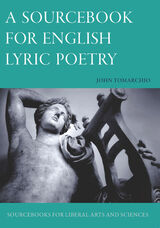
A Sourcebook for English Lyric Poetry
John Tomarchio
Catholic University of America Press, 2023
This Sourcebook is not a survey of English lyric poems but rather a florilegium. It singles out great poems of the last five centuries worthy of study in liberal education—in Great Books programs, Core curricula, and the Humanities generally. The poems were selected not as representative of the author’s time or oeuvre, but rather as addressed to the reader and the reader’s time by virtue of their representing the nature of things. That is what makes a poem great and worthy of inquiry, in John Tomarchio’s judgement. The capacities, needs, and interests of students of such great poetry were the principles of selection.
To arrange the great poems selected Tomarchio looked to their meters as a formal measure intrinsic to them, rather than to epochal divisions. The paradigmatic example of this is the classical English sonnet. Many an English poet has submitted themselves to the self-discipline of this poetic form born in the classical period of English poetry in Tudor England. But what of such historical context? When Robert Frost chooses to write a sonnet in the 20th century, why associate it more with the free verse of e.e. cummings than of the quincentenary sonnet tradition his chosen form invokes for context?
The Sourcebook arranges poems according to five such metrical modes, however along with an Index by poet as well . Tomarchio’s enumeration of poetic modes does not presume to be either exhaustive or normative, but rather interpretative of poetic practices and hopefully more elucidative than historical considerations. Further, as understanding great poetry’s means deepens interpretation of ends, the Sourcebook begins with a propaedeutic “grammar” that introduces students to such devices of poetic art as meter, rhyme, and trope.
[more]
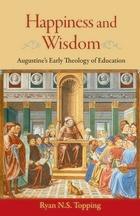
Happiness and Wisdom
Augustine's Early Theology of Education
Ryan N. S. Topping
Catholic University of America Press, 2012
Happiness and Wisdom contributes to ongoing debates about the nature of Augustine's early development, and argues that Augustine's vision of the soul's ascent through the liberal arts is an attractive and basically coherent view of learning, which, while not wholly novel, surpasses both classical and earlier patristic renderings of the aims of education.
[more]
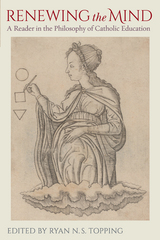
Renewing the Mind
Ryan N.S. Topping
Catholic University of America Press, 2015
Renewing the Mind includes an introductory essay on the history and renewal of Catholic education, followed by 38 selections each with an introduction, biography, and study questions; adorning the text throughout are illustrations from the National Gallery of Art. Educators of children and college students will find this an essential guide to the best of what has been said about what it means to be conformed to the mind of Christ.
[more]
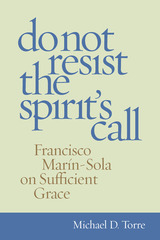
Do Not Reisist the Spirit's Call
Michael D. Torre
Catholic University of America Press, 2013
In this book, Michael D. Torre makes Marín-Sola's articles available in English for the first time. The articles are preceded by an introduction on Marín-Sola and followed by a conclusion that traces the reception of his thought within the Catholic theological community. In Torre's afterword, he defends Marín-Sola's position as substantively the same as that of Aquinas.
[more]
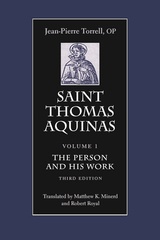
Saint Thomas Aquinas
The Person and His Work
Jean-Pierre Torrell, OP
Catholic University of America Press, 2022
The presentation of the life and work of any great thinker is a formidable task, even for a renowned scholar. This is all the more the case when such a historical figure is a saint and mystic, such as Friar Thomas Aquinas. In this volume, Fr. Jean-Pierre Torrell, OP, masterfully takes up the strenuous task of presenting such a biography, providing readers with a detailed, scholarly, and profound account of the thirteenth-century theologian whose works have not ceased to draw the attention of both friend and foe! In this volume, Fr. Torrell, an internationally renowned expert on St. Thomas, speaks to neophytes and experts alike: for those new to Thomas’s works, he paints an engaging human portrait of Friar Thomas in his historical context; for specialists, he provides a rigorous scholarly account of contemporary research concerning Thomas’s life and work. This new edition of Fr. Torrell’s widely-lauded text involved significant revision, expansion, and bibliographical updates in light of the latest scholarship. The Catholic University of America Press is pleased to present such an eminent specialist’s mature synthesis concerning Friar Thomas Aquinas.
[more]
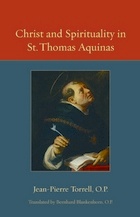
Christ and Spirituality in St. Thomas Aquinas
Jean-Pierre Torrell
Catholic University of America Press, 2011
The studies in this volume investigate themes of particular spiritual relevance in Aquinas's theology: friendship, charity, prayer, configuration to Christ, priesthood, preaching.
[more]
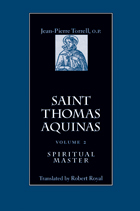
Saint Thomas Aquinas, Volume 2
Spiritual Master
Jean-Pierre Torrell
Catholic University of America Press, 1996
Following his highly acclaimed study of the life and works of Saint Thomas Aquinas, Jean-Pierre Torrell, O.P., continues his masterful work on the great Dominican theologian and brings an immense learning to bear on a subject that most readers have not considered very carefully: Thomas's spirituality
[more]
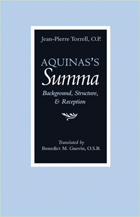
Aquinas's Summa
background, structure, & reception
Jean-Pierre Torrell
Catholic University of America Press, 2005
In this concise new volume by the acclaimed author of the biography of Saint Thomas Aquinas, Jean-Pierre Torrell brings his expertise to bear on Aquinas's Summa Theologiae.
[more]

A Brief Life of Aquinas
The Theologian in His Context
Jean-Pierre Torrell
Catholic University of America Press, 2024
Jean-Pierre Torrell, OP, who has already written the most highly-regarded contemporary two-volume introduction to the life and works of Saint Thomas, has composed a shorter book that captures the essence of the career of the Angelic Doctor for a more general audience. Torrell follows a biographical outline of the saint, although he also includes brief accounts of what the author takes to be the most important features of Aquinas's teachings.
Part biography, part travelogue, part theology, Jean-Pierre Torrell, OP’s A Brief Life of Thomas Aquinas is a multi-faceted look at the life and the writings of Saint Thomas Aquinas. Torrell’s hope is that his biography of the doctor communis intertwined with his theological examination of Aquinas’s writings will enable the reader to understand the person behind the writer and the writer behind the person. Aquinas’s life, Torrell claims, can shed light on his work with respect not only to their number, or to the varied topics he writes about, but to their content as well. It would be inaccurate to view Aquinas hiding behind a mountain of books in the cells he occupied in the various houses he inhabited around the Dominican world. He taught, he preached, he debated, he faced a number of conflicts of ideas that were not of his own making, but out of which would come some of his best-known writings. Torrell’s unique approach makes accessible one of the greatest minds of our tradition and the richness of the legacy he left the Church.
[more]

John Paul II on the Vulnerable
Jeffrey Tranzillo
Catholic University of America Press, 2013
In John Paul II on the Vulnerable, Jeffrey Tranzillo provides a lucid introduction to John Paul II's philosophical and theological understanding of the human person.
[more]

Truth Matters
Essays in Honor of Jacques Maritain (American Maritain Association Publications)
John G. Trapani Jr.
Catholic University of America Press, 2004
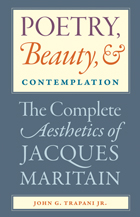
Poetry, Beauty, and Contemplation
The Complete Aesthetics of Jacques Maritain
John G. Trapani Jr.
Catholic University of America Press, 2011
Poetry, Beauty, and Contemplation provides a basic introduction to, and an extensive examination of, Maritain's philosophy of art and beauty
[more]
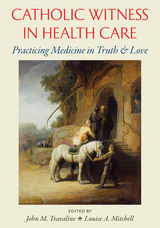
Catholic Witness in Health Care
Practicing Medicine in Truth and Love
John M. Travaline
Catholic University of America Press, 2017
Catholic health care is about ethics but also "ethos" – not only what we shouldn't do but a vision for what we should do with love. The issues it faces don't just concern academic bioethicists – they concern every faithful Catholic doctor, nurse, practitioner, and even patient. Modern medical practitioners on the ground, day-in, day-out, wrestling with medical moral matters, witnessing what is happening in American medicine today, while also striving to witness to their Catholic faith in living out their medical vocation – these are the primary authors of this unique book, and these are the readers it hopes to serve.
Catholic Witness in Health Care integrates the theoretical presentation of Catholic medical ethics with real life practice. It begins with fundamental elements of Catholic care, touching upon Scripture, moral philosophy, theology, Christian anthropology, and pastoral care. The second part features Catholic clinicians illuminating authentic Catholic medical care in their various medical disciplines: gynecology and reproductive medicine, fertility, pediatrics, geriatrics, critical care, surgery, rehabilitation, psychology, and pharmacy. Part three offers unique perspectives concerning medical education, research, and practice, with an eye toward creating a cultural shift to an authentically Catholic medical ethos.
Readers of this book will learn essential elements upon which the ethics of Catholic medical practice is founded and gain insights into practicing medicine and caring for others in an authentically Catholic way.
Catholic Witness in Health Care integrates the theoretical presentation of Catholic medical ethics with real life practice. It begins with fundamental elements of Catholic care, touching upon Scripture, moral philosophy, theology, Christian anthropology, and pastoral care. The second part features Catholic clinicians illuminating authentic Catholic medical care in their various medical disciplines: gynecology and reproductive medicine, fertility, pediatrics, geriatrics, critical care, surgery, rehabilitation, psychology, and pharmacy. Part three offers unique perspectives concerning medical education, research, and practice, with an eye toward creating a cultural shift to an authentically Catholic medical ethos.
Readers of this book will learn essential elements upon which the ethics of Catholic medical practice is founded and gain insights into practicing medicine and caring for others in an authentically Catholic way.
[more]
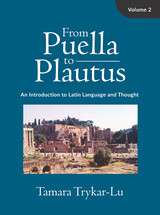
From Puella to Platus
An Introduction to Latin Language and Thought, Volume 2
Tamara Trykar-Lu
Catholic University of America Press, 2019
Whether to enlarge your general education, improve your English, or just because you are curious about the society that has had such a lasting influence on our history, our language, our thoughts, and our culture, you should and can learn Latin.
Tamara Trykar-Lu's charming and delightful introduction to Latin, From Puella to Plautus, Part I, is designed for beginning to intermediate Latin study, at the high school or college level, either with the aid of a teacher and classroom or simply for personal enjoyment and enrichment. A thorough review of English grammar with detailed explanations makes it easy for the reader to grasp new concepts in Latin. Learning Latin vocabulary becomes manageable once you realize how much ‘Latin’ vocabulary there is in English. You will quickly learn to read Latin with short stories and, gradually, more demanding selections. Readers will translate the story of Romulus and Remus and the founding of Rome, but also the tale of Nivea -- Snow White -- and some parts of Shakespeare's plays. Short sections show how English developed, how Latin influenced it, and where they both belong in the world of languages.
Each chapter ends with a brief outline of some aspect of Roman culture, such as housing, fauna and flora, games, crafts, water supply, and cooking – with recipes. And last but not least there are informative tidbits, drawings, cartoons, jokes, riddles, crossword puzzles, and, of course, pictures distributed throughout the book. For while foreign-language study should be logical, coherent, and rigorous, it need not be heavy-handed or pedantic, and certainly not dull. Ideal for use in courses or for brushing up your language skills, From Puella to Plautus is a lively and engaging book about the Latin language and life in the Roman Empire.
[more]
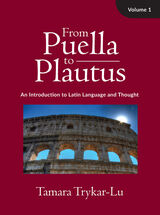
From Puella to Plautus
An Introduction to Latin Language and Thought, Volume 1
Tamara Trykar-Lu
Catholic University of America Press, 2019
Whether to enlarge your general education, improve your English, or just because you are curious about the society that has had such a lasting influence on our history, our language, our thoughts, and our culture, you should and can learn Latin.
Tamara Trykar-Lu's charming and delightful introduction to Latin, From Puella to Plautus, Part I, is designed for beginning to intermediate Latin study, at the high school or college level, either with the aid of a teacher and classroom or simply for personal enjoyment and enrichment. A thorough review of English grammar with detailed explanations makes it easy for the reader to grasp new concepts in Latin. Learning Latin vocabulary becomes manageable once you realize how much ‘Latin’ vocabulary there is in English. You will quickly learn to read Latin with short stories and, gradually, more demanding selections. Readers will translate the story of Romulus and Remus and the founding of Rome, but also the tale of Nivea -- Snow White -- and some parts of Shakespeare's plays. Short sections show how English developed, how Latin influenced it, and where they both belong in the world of languages.
Each chapter ends with a brief outline of some aspect of Roman culture, such as housing, fauna and flora, games, crafts, water supply, and cooking – with recipes. And last but not least there are informative tidbits, drawings, cartoons, jokes, riddles, crossword puzzles, and, of course, pictures distributed throughout the book. For while foreign-language study should be logical, coherent, and rigorous, it need not be heavy-handed or pedantic, and certainly not dull. Ideal for use in courses or for brushing up your language skills, From Puella to Plautus is a lively and engaging book about the Latin language and life in the Roman Empire.
[more]
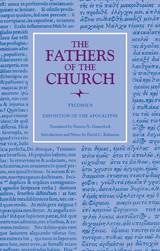
Exposition of the Apocalypse
Tyconius Tyconius of Carthage
Catholic University of America Press, 2017
The Exposition of the Apocalypse by Tyconius of Carthage (fl. 380) was pivotal in the history of interpretation of the Book of Revelation. While expositors of the second and third centuries viewed the Apocalypse of John, or Book of Revelation, as mainly about the time of Antichrist and the end of the world, in the late fourth century Tyconius interpreted John’s visions as figurative of the struggles facing the Church throughout the entire period between the Incarnation and the Second Coming of Christ. Tyconius’s “ecclesiastical” reading of the Apocalypse was highly regarded by early medieval commentators like Caesarius of Arles, Primasius of Hadrumetum, Bede, and Beatus of Liebana, who often quoted from Tyconius’s Exposition in their own Apocalypse commentaries. Unfortunately no complete manuscript of the Exposition by Tyconius has survived. A number of recent scholars, however, believed that a large portion of his Exposition could be reconstructed from citations of it in the aforementioned early medieval writers; and this task was undertaken by Monsignor Roger Gryson. Gryson’s edition, a reconstruction of the Expositio Apocalypseos of Tyconius, was published in 2011 in Corpus Christianorum Series Latina. The present translation of that reconstructed text, with introduction and notes, exhibits Tyconius’s unique non-apocalyptic approach to the Book of Revelation. It also shows that throughout the Exposition Tyconius made use of interpretive rules that he had laid out in an earlier work on hermeneutics, the Book of Rules, strongly suggesting that Tyconius wrote his Exposition as a companion to his Book of Rules. Thus, the Exposition served as an exemplar of how those rules would apply to interpretation of even the most intriguing of biblical texts, the Apocalypse.
[more]
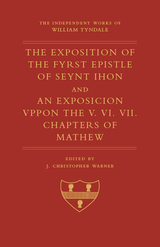
The Exposition of 1 John and An Exposition upon Matthew V-VII
William Tyndale
Catholic University of America Press, 2023
The Exposition of 1 John and An Exposition upon Matthew V-VII are William Tyndale’s two major exegetical writings, published respectively in 1531 and 1533 in Antwerp. By this period Tyndale’s English translations of the New Testament and Pentateuch had both been printed, and he was preparing a revised version of the former to be published in 1534. Among the books he produced in the interim are these verse-by-verse commentaries on St. John’s first epistle and on Jesus’s Sermon on the Mount. In them Tyndale characteristically alternates between fierce polemics and solemn homilies that together, as has been claimed, amount to the most complete articulation of his theological positions. This volume replaces the nineteenth-century editions on which scholars and students have long relied by providing an original-spelling text of each Exposition with notes recording substantive textual variants in all sixteenth-century editions; an introduction and extensive commentary documenting, in particular, parallels and differences between the two texts and Tyndale’s other works, the works of Luther and other reform theologians, and the works of the Church Fathers and others; plus a comprehensive glossary, appendices, and indices.
[more]
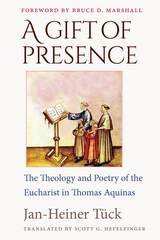
A Gift of Presence
The Theology and Poetry of the Eucharist in Thomas Aquinas
Jan Heiner Tück
Catholic University of America Press, 2018
Jan-Heiner Tück presents a work that explores the sacramental theology, lived spirituality, and Eucharistic poetry of the Church’s doctor communis, St. Thomas Aquinas. Although Aquinas’ Eucharistic poetry has long occupied an important place in the Church’s liturgical prayer and her repertoire of sacred music, the depth of these poems remains hidden until one grasps the rich sacramental theology underlying it. Consequently, Tück first offers a detailed but approachable primer of Aquinas’ theology of the sacraments, before diving deeply into the Angelic Doctor’s theology and poetry of the Eucharist. The Scriptural accounts stand at the heart of the systematic framework developed by Aquinas, and thus significant attention is devoted to showing the harmony between the accounts of Christ’s passion and the detailed exposition of the Summa theologiae. Moreover, the Eucharistic controversies of the ninth and eleventh centuries provide the contrapuntal context in which Aquinas did his thinking, praying, and writing. Not surprisingly, therefore, the response he crafts to these controversies draws upon both speculative powers and contemplative prayer, brought together in the unity of Aquinas’ theology and spirituality. The net result is a twofold treasure for the Church: a careful systematic presentation of Eucharistic theology and the lived devotional expression of the same in the carefully constructed—and now much beloved—stanzas of Pange lingua gloriosi, Lauda Sion, Adoro te devote, etc. By revealing the lively interplay of the saint’s powerful speculative intellect and a heart steeped in love for the Eucharistic Lord, Tück offers a sophisticated exposition of Aquinas’ Eucharistic poetry and the roots it sinks into a wider theological framework. Finally, the contemporary significance and power of Aquinas’ work is drawn out, not only in the rarefied realm of intellectual inquiry but also in the everyday expanse of ordinary life.
[more]
READERS
Browse our collection.
PUBLISHERS
See BiblioVault's publisher services.
STUDENT SERVICES
Files for college accessibility offices.
UChicago Accessibility Resources
home | accessibility | search | about | contact us
BiblioVault ® 2001 - 2024
The University of Chicago Press









